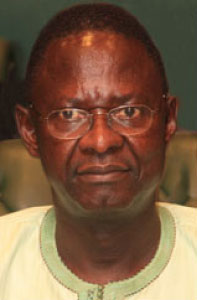
The Minister of Finance and Economic Affairs Kebba S Touray yesterday presented before deputies at the National Assembly in Banjul the 2014 budget statement and economic policy of the Gambia government, with total domestic revenue and grants estimated at D8.6 billion in 2014 up from D7.6 billion in 2013.
Representing a growth of 13.5 percent, Finance Minister Touray said this is principally due to a 20.5 percent expected rise in tax revenue and a 32.0 percent projected increase in non-tax revenue.
‘‘These forecasts assume that there will be improvements in compliance levels, as well as the implementation of new revenue measures. Included in the total revenue projection is a budget support of D313 million from the World Bank and African Development Bank,’’ he told deputies.
Total expenditure and net lending, he added, is projected at D10.2 billion, up from D8.3 billion in 2013, representing an increase of 22.9 percent.
‘‘Recurrent expenditure is expected to increase from D3.6 billion in 2013 to D4.96 billion in 2014 representing an increase of 38 percent whilst Capital spending, including externally financed, is estimated to remain at D2.7 billion in 2014. The fiscal deficit is projected at D1.6 billion compared to the revised projected deficit of D2.4 billion for 2013 representing a decrease of 33.3 percent,’’ he stated.
Noting that net domestic borrowing is projected to be limited to D933.5 million in 2014, which is 2.5 percent of GDP, the Minister of Finance told deputies that external loan disbursement to finance new and ongoing projects is estimated at D2.5 billion whilst the repayments of principals on external loans is programmed at D763 million.
Giving a rundown of developments in the domestic economy in particular the real sector, Finance Minister Touray said the real Gross Domestic Product at constant market prices for 2013 is estimated o grow by 5.6 percent compared to 6.1 percent recorded for the previous year.
‘‘The major contributors to growth in economic activity for 2013 are the agricultural sector with 9.7 percent compared to 6 percent in 2012. Followed by the industry sector with 7.0 percent compared to 6.4 percent in 2012 and the services sector with 3.7 percent compared to 4.8 percent in 2012,’’ he stated.
According to Touray, the growth in the agriculture sector is mainly driven by increase in crop production, livestock, forestry and fisheries which recorded 14.8, 4.6, 3.4 and 4 percent respectively, whilst the growth in the industrial sector is mainly coming from the Construction sub sector.
Electricity and water, he explained, recorded a growth of 2.2 percent mainly attributed to the expansion in rural electrification.
‘‘Tourism, transport, communication, financial services and real estate continue to grow by 8.5, 6.0, 3.7 and 3.3 percent respectively. In terms of contribution to GDP, the services sector continues tone the major contributor with 57.1 percent, followed by the agricultural sector with 22.2 percent and the industry sector with 14.8 percent,’’ Finance Minister Touray told deputies.
The Minister of Finance and Economic Affairs also told deputies that in the 2014, revenue measures will be introduced, among them an increase in the presumptive tax base for commercial vehicles and boats.
According to him, the government will raise specific excise on tobacco products from D5 per pack to D9 per pack and environmental tax rate on tobacco products from D0.20 per pack to D2.10 per pack.
He also announced that government will raise the specific excise on other tobacco products from D37.50 per kilogram to D150 per kilogram and environmental tax rates on other tobacco products and from D75 per kilogram to D100 per kilogram.
Government also plans to include customs duties and other charges in the base for excise tax calculation; introduce air transport tax on the sale of air tickets at the rate of 15 percent, replacing the sales tax, which was abolished in 2012, Touray stated.
He said the government will also reduce the corporate tax by 1 percent to 31 percent in line with its commitment to lower the corporate tax rate to a regionally competitive level.



